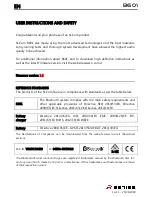
DISPLAY OPTIONS MENU
USER LAST SETUP: You can change t he Power-On display from V EHI CLE DATA MENU (default) to the last
display having been displayed just before the instrument was turned off.
CONTRAST:
This setting, expressed as a percentage, determines the contrast ratio between display text or
graphics and the LCD background.
0 % is all white. 100 % is all black.
In practice, the percentage will be somewhere bet ween 30 % and 80 %, to have a good
readable display.
You can also change contrast by pressing the LIGHT key and keeping it pressed until you
reach the desired contrast level.
GRATICULE:
Can be set On or Off (default is On).
A dot type graticule assists in making visual voltage and timing measurements. The distance
between adjacent dots is one division. The graticule also allows you to easily compare wave
forms between CH A and CH B and stored waveforms for timing and voltage differences.
HORIZ TRIG POS:
Horizontal Trigger Position can be set to three different horizontal locations (10 %, 50 %, or
90 %) on the display, depending on whether you want to see conditions that led up to the
trigger event, or those following it.
ACQUIRE MODE:
Can be set to Peak Detect mode (default) or Normal mode.
• Peak Detect - This is the default mode to det ect glitches and reduces the possibility of
aliasing.
• Normal - Use to acquire 480 points and display them at the SEC/DIV setting.
< Key Points >
If you probe a noisy square wave signal that contains intermittent and narrow glitches, the
waveform displayed will vary depending on the acquisition mode you choose.
Normal
Peak Detect
The next two topics describe each of the types of acquisition modes and their differences.
Peak Detect. Use Peak Detect acquisition mode to detect glitches as narrow as 1 µs and to
limit the possibility of aliasing. This mode is effective when at 10 µs/div or slower.
• Sample points displayed
Peak Detect mode displays highest and lowest acquired voltage in each interval.
5-15
INSTRUMENT SETUP : Use this menu option to set the following:
• Optimal settings for display.
• Optimal settings for noise filter to each INPUT.
• Auto-Power-Off ON and OFF and adjusting Auto-Power-Off Time.
• Language for menus and help text.
• Scope Calibration
Changing Vehicle Data
If the vehicle data do not match with the vehicle under test, you could get incorrect test results and may not be able
to select all available tests for this vehicle.
Because this menu is very important for the proper use of the instrument, it also appears at power-on as the start-up
display.
CYLINDERS: 1, 2, 3, 4(default), 5, 6, 8, 10, or 12. Specifies the number of cylinders on the vehicle under test.
CYCLES:
2 or 4(default). Specifies a two-or four-stroke engine.
BATTERY:
12 V (default) or 24 V. Specifies battery voltage.
IGNITION:
CONV (default), DIS, or DIESEL.
Specifies the type of ignition system.
CONV (conventional) indicates systems using a distributor.
DIS (or EI) indicates Distributorless Ignition Systems.
DIESEL indicates ignition systems of Diesel engine.
Changing Instrument Setup
5-14
VEHICLE DATA
INSTRUMENT SETUP
VEHICLE DATA MENU
CYLINDERS : 4
CYCLES
: 4
BATTERY : 12 V
IGNITION : CONV
INSTRUMENT SETUP MENU
DISPLAY OPTIONS
FILTER
AUTO POWER OFF
LANGUAGE
SCOPE CALIBRATION
MENU ( )
MENU ( )
















































